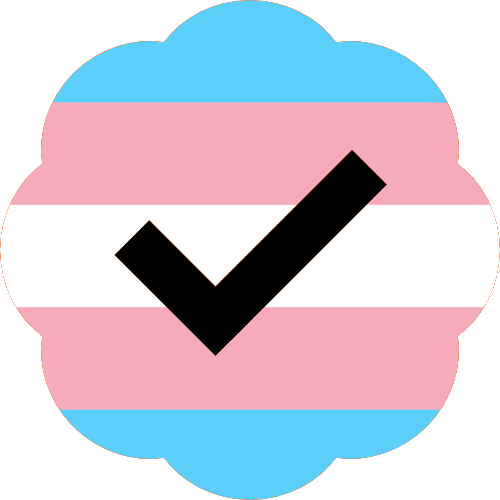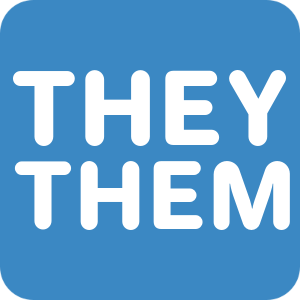Queries over audio tools for the purposes of voice pitch analysis
#voicetraining
Just now during voice training, I said out loud, "What the fuck?; I sound like an old Black lady!" then immediately followed it with, "Oh. Right."
#VoiceTraining
RSD and anxiety over first NHS-funded voice training appointment (initial assessment)
@newo Without going into techical stuff, voice training theory can be complex.
We found this fairly-recent (May 2025) video by a gender-affirming voice coach who really isn't a fan of Voice Tools, but also has advice on how to use it in a way that won't crush your soul.
https://www.youtube.com/watch?v=5QrpDpVQMPs
It's honestly refreshing to see a voice coach who has multiple issues with multiple aspects of Voice Tools, and how ridiculous it is to gender a voice solely based on its fundamental frequency.
Here's a snippet from the description of the video:
Whether you're brand new to trans voice work or you've been practicing for years, this breakdown covers:
- Why the pitch ranges in Voice Tools are misleading
- Why "percent male/female" scores can be actively harmful
- What features are actually useful (and how to customize them)
- How to use the spectrogram for resonance training
- What to avoid completely if you want to stay confident in your journey
It's basically a hack for how to make Voice Tools a bit less cursed, and actually useful for some specific things.
FYI, if you ever want to know what we sounded like back around 2004-2005 ish, the audio from the video within this post will give you a good idea.
We've not had the necessary combination of time, spoons, focus, motivation, and privacy to do a trans voice recording recently, so the last one we did was this rant / vent back at the end of January 2025.
(Polite request: even if you think our current voice sounds nice or femme, please don't comment that, as it really doesn't sound that way to us, to most other people on the phone, or to a lot of cis strangers )
Update on NHS gender-affirming care stuff; largely negative, with a teeny-tiny bit of good; here be trauma dragons!
omg fam—
a cis lady who i have absolutely no reason to believe clocked me complimented me on my voice today. i didn't even know that was an unlockable achievement.
had me on cloud nine the rest of the evening!
I just released Version 2.1.0 of “Free Voice Training”, the privacy-focused voice-training software I’m developing.
You can try it out on the current flag-ship instance.
As with every previous version, it will never contact any webserver except to download the source-files and it is intentionally possible to download the html-file (that contains all necessary resources) and open it as a file on your device without internet.
If you don’t want to go that far, but still have offline-use you can install it as a progressive web-app, and enable caching in the settings-menu. (If you have done so already, go there, press the “Attempt Update”-button and reload to get the latest version.)
Those things aside, here are some of the new features:
Most importantly, you can now save recordings. Just enable the “Store settings” and “Store data”-checkboxes in the settings menu and all recordings will be stored until you manually delete them.
Be warned that unchecking the “Store data”-checkbox won’t delete old data, it will just stop new data from being stored! If you want to delete old recordings you can either use the delete-buttons in the results-table or delete all local data (but not settings) with the “Delete Stored Data”-button.
The second big new feature is that you can now add your own texts: Press the “”-button below the text-box and you will get a dialog in which you can select the language, the name and the contents of the new text. Once you’ve done that, you can add it to the text-storage with the “
”-button of the dialog. If you have data-storage enabled, this will be stored in the same database as your recordings and persist after reloads.
If you want to add a text in a language that is not yet in the system, you can use the “”-button of the language selector to add a new one. You have to give a name (e.g. “Malti” for Maltese) and a language Code (e.g. “mt”) and confirm. This will both be used to sort your text in the text-display and to mark it in HTML as having that language so please use standard codes.
That said: If you have good public domain texts, especially in languages that are not yet listed, PLEASE submit a feature-request to add them on the project-page on gitlab. And this does not just apply to extremely widely used languages like Spanish and Polish, but also to smaller languages like Catalan or Danish! (Looking at various people here. )
If you want to delete a custom text directly, you can select it in the display-section and press the “”-button. This does not work with default-texts though.
If you want to delete a custom language, the only way is currently to delete the entire database of custom data; That’s not ideal, and I hope to change that in a future version, but for now just don’t create too many languages that you want to get rid of afterwards.
There is now an easy-way to provide site-specific legal information regarding data-protection, which can be found in the legal-dialog (“”-button).
If you want to run a mirror (PLEASE do!), I’m happy to provide you with assistance in setting that up.
With that we get into the smaller features:
Starting and stopping a recording will now draw a vertical line on the spectrogram, just like playing back an old recording does.
The target-frequency-selector now displays the musical note and “gender” of the chosen frequency.
The results table stores date and time of the recording.
And several minor improvements to eye-candy.
Please share and do your voice-training! (if you want to. )
#trans #transfem #transVoiceTraining #FreeTransVoiceTraining #VoiceTraining #transition #floss #foss #FreeSoftware
Without claiming that there aren’t obvious things to improve or that it is “finished”, I just decided that the current version of my “Free Voice Training”-software (FTVT) is ready for a 2.0.0 release:
You can find my instance of it here.
This version is essentially an improvement over what was there before in just about every way:
First of all, it actually has a version-number! The reason this is version 2.0.0 and not 1.0.0 is simply that the older version of the software was for so long in actual use that calling it anything less than 1.0 would feel wrong, but there were also significant enough changes to make this a major release. That’s why it is 2.0.
On the user-facing side the most obvious change is the massively improved design. Just compare the version on the flagship-instance with the older version that is for now still available here.
But that’s not the only thing: There is now explicit support for this to be installed as a progressive web app (PWA), which makes it almost like a normal app on mobile devices. In particular this also means that it is now much easier to use it offline: While it was always intentionally possible to download the files and open the entire thing via file:///…, installing a PWA might be a bit easier on mobile, improving the accessibility. (It might also allow to add it to fdroid, I’ll see about that at a later point in time).
Now, a PWA of course has the issue that it leaves traces in the browser, but it may reduces traces left on the web, and if you don’t religiously clean your browsing history anyways, it’s possible to see where you were if you get access to it, so it’s not too bad of a trade-off.
Speaking of traces: It’s now possible to store settings in the local storage of the browser. So far this is largely inconsequential, but for a future version I want to add the ability to store the recordings as well! Of course all of that is strictly opt-in. If you don’t do anything the app won’t leave any traces on your browser that your browser doesn’t create anyways.
That said, there are also significant improvements on the software-side of things: Not only did I improve the quality of the code-base by a lot (still not great though!), I also replaced most of the previous super-sketchy build-system with something slightly less so to the point where others might even be interested in having a look at it: esbuild for bundling, currently run by makefiles. I still refuse to let most other javascript-code near it, but esbuild seems established enough for me to be willing to risk using it.
So, if you need a voice-recorder that is specifically made for trans voice training and puts a huge focus on user privacy, give it a try, for example on the next #TransVoiceFriday!
#trans #transgender #voicetraining #transvoicetraining #transfem #transmasc #FTVT #FreeTransVoiceTraining
Hey folks
We've actually done a #TransVoiceFriday recording for the first time in ages 
Please note, however, that the topic of our recording is voice dysphoria, so please don't listen to it if doing so well cause you anxiety or stress
It ended up a bit longer than our typical ones, so we can't put the transcript in the alt text, due to the stupid alt text limit that not even Glitch-SOC will let us increase
As such, we've added the full transcript below within this post
#TransVoice #VoiceTraining #VoiceFeminisation #VoiceDysphoria #trans #transgender #TransFem #TransWoman #transition #queer #LGBTQ+ #LGBTQIA+
Transcript
Hey lovelies. It's just about still Friday, so we thought we'd try to do a Trans Voice Friday recording for the first time in... so long that we literally have no idea when we last recorded one! Honestly don't even remember if we've even done one this year! We're recording from our phone, rather than our desktop microphone, so apologies if the quality is shitty. Please note that any perceived poor quality might just be our shitty voice.
Okay, so for anyone who doesn't already know, our voice has been and sadly continues to be a constant source of gender dysphoria for us. Our voice dysphoria negatively impacts us perhaps a level of magnitude more than facial dysphoria, which in turn is noticeably above genital dysphoria for us. And sadly it's been getting worse for us over time.
Back when we first started voice training in December 2021, we were cautiously optimistic that maybe, just maybe, over time we'd manage to achieve a voice that sounded at least tolerable to us, and which didn't constantly get us misgendered. For a while, it felt like we were even making progress. However, we've been increasingly misgendered not just on the phone but in person, and honestly we're really struggling with it. It's not like we can afford voice feminisation surgery like endoscopic modified Wendler Glottoplasty, and despite multiple requests and complaints, our shitty NHS gender clinic won't even meet with us to let us plead our case for them to request funding for it. Even if they agreed to submit an Individual Funding Request for us, which they refuse to do, it would still ultimately be up to our local Integrated Care Board to review and make a decision on whether to fund it or not, and their answer would almost certainly be "no".
We're trying to find a way forward, but honestly we're kind of just holding on right now. Please, please kindly don't tell us that we'll get there in time, that we just need to work harder, or that our voice sounds fine to you. We've worked as hard as we can for over 3 and a half years, and we've not only plateaued, but seemingly gone backwards, based on the increased frequency of misgenderings. We currently don't know where to go from here, but it won't be something that we can easily or quickly achieve. Voices are instruments, and not everyone has a good one, nor the ability to achieve a voice that makes them happy and gets them correctly gendered at least most of the time.
The only joy we have had with our voice at all recently was making our electrologist laugh by dropping our voice down to approximate how we used to sound. It was genuinely lovely to hear her say that she can't believe we used to sound like that, and how it doesn't sound to her like it's us speaking. For those of you who want to hear that voice, {drops voice} it roughly sounds like this. It's not exactly how we used to sound, as we don't ever use our pre-transition voice except as a gimmick to make people laugh, but it's about as close as we can get now, and it highlights the progress we have made, even though it's not enough for us to feel content or get consistently gendered correctly. {restores voice}
Please be mindful of survivorship bias in online voice training videos, as well as the culture of toxic positivity that is sometimes associated with it. We don't want people to give up, but it's really important to have realistic goals and know that not everyone will succeed by voice training alone.
But anyway, we've talked far too long, and that's more than enough voice dysphoria discussion for a while. Take care of yourselves folks.
Below, you will find various links related to theory, harmony and counterpoint, and a comparison of older and modern methods of teaching and singing. While this relates to choirs and opera, it also relates to the theatre, particularly operettas and such.
Studying Music: Part I
https://dandylover1.dreamwidth.org/205086.html
My one criterion was that the methods and books used had to be from the time of Ivor Novello, preferably from his youth (born 1893). If I were to start in the early nineteenth century, which is where most of my preferred non-musical educational material is from, I would miss extremely important developments in classical music. Starting at the birth of his mother, Clara Novello Davies, in 1861, would be fine. However, since her own book, which I am using as my main text and guide, was written in 1928, I went with that of her son. In the following sections, you will find the books I am using. One thing I have not included, though it was a huge influence in Ivor's own writing style, was theatrical music, such as that found in operettas and Edwardian musical comedies. That is such a large topic for discussion that I feel it deserves its own separate post, as does Ivor's music, since it's an interesting blend of all of the above. But this is well outside the scope of traditional musical study.
In the next entry (the below link), we will delve into vocal training and why the singers of Novello's time sound so wonderful.
Studying Music: Part II
https://dandylover1.dreamwidth.org/205505.html
Finally, since I mentioned the exercises, here they are, for anyone who wants to try them. Note that these are the Preliminaries and Breathlock Physicals, not the vocal exercises. But I have provided the link to her book as well, for those who may wish to go further.
Clara's Exercises
https://dandylover1.dreamwidth.org/205596.html
#books #choir #ClaraNovelloDavies #counterpoint #exercises #harmony #history #IvorNovello #music #musictheory #opera #operetta #singing #studying #vocaltraining #voicetraining #theater #theatre
Hey fedi lovelies 

Today's #TransVoiceFriday is unfortunately a rant about so many things going wrong in the world, so please, please don't listen to it if you're not in the right frame of mind for this.
#TransVoice #VoiceTraining #rant #vent #MagnetoWasRight #TransRightsAreHumanRights #trans #transgender #queer #LGBTQ+ #LGBTQIA+ #voice
Vent re: survivorship bias in voice training, with a focus on voice feminisation
https://en.wikipedia.org/wiki/Transgender_voice_therapy
Its time to voice train again!
Here I did some voice training reading this wikipedia this time. Also wow after this my voice is tireddd lol and it doesnt even sound that fem >.< (or maybe im just too hard on myself?) Feedback, encouragement, and people who also want to post along with me reading this article welcome!
#VoiceTraining #TransVoice #Trans
In solidarity with @ChaosKitsune, per her thread here, we thought we'd record the first paragraph from the Wikipedia article on Gamma Rays. It's genuinely a big deal to share your voice online, especially when you've got massive voice dysphoria, so we wanted to show some support.
N.B., Yes: we have massive voice dysphoria ourselves after 3+ years of training, despite the progress we've objectively made.
https://en.wikipedia.org/wiki/Gamma_ray
Here I did some voice training reading this wikipedia haha. I kept telling myself id voice train so here is my first attempt in a while. Open to feedback... My gosh its kinda embarrassing to upload this XD
#VoiceTraining #TransVoice #Trans
Not sure if this really counts as a #TransVoiceFriday recording

Fedi can have it anyway  For morale
For morale 
Reminder: if you are #Transgender, trying to #GenderTransition, and don't have access to #HRT, there are other things you can do...
I have only ever gone through an #MtF #transition, so I don't know the #FtM options beyond binders, supplements, and workouts, but I know they exist.
Herbal Supplements, like Spearmint/Pepperment Tea and Licorice Root Pills have been shown to be effective at lowering #Testosterone levels.
#VoiceTraining, even DIY, can give people impressive results, no hormones required.
There are diets and exercises which can significantly change your body shape, even without hormones.
Corset Training, especially paired with diet and exercise, can do things for you.
Chastity Cages aren't just for Fetish Play: they have a long history of use for semi-medical reasons, and this is one of them. You can cage-train for better tuckability.
There's more, like less formal routes to medical options, but the point is, there's a lot you can do if you have to wait!
It's 2 days late, but here's a belated #TransVoiceFriday recording... on a Sunday... so, #TransVoiceSunday, we guess?
Some musings on men with softer voices
I'm trans masc and my voice is often heard as more "feminine" even though I've been on T for years. It happens all the time, but mostly on the phone. I don't mind my voice though.
Aside from the queer male community being a very common place to hear men with softer voices (which is wonderful), there are also many men raised exclusively or primarily by women and other feminine people, that have softer voices, even if they're straight. This doesn't necessarily mean their voices aren't "deep", but it means when it comes to speaking, they carry themselves in a more cordial and cautious way. They're not interested in being the loudest or the "deepest".
If a guy has a soft voice, I feel more comfortable around them, because I think they've taken an important step towards dismantling toxic masculinity:
They're actively combating the notion that posturing is necessary (and normal) to be a "man". This in turn breaks the idea that everything is a competition to be the man. It rejects the notion that you need to project power in every way, even in the way you speak.
For that reason, and many more, it's OK to not do voice training if you don't want to. It doesn't make you less of a man (or any other gender). It doesn't make you less trans. It doesn't make you less valid.
You sound fine.






